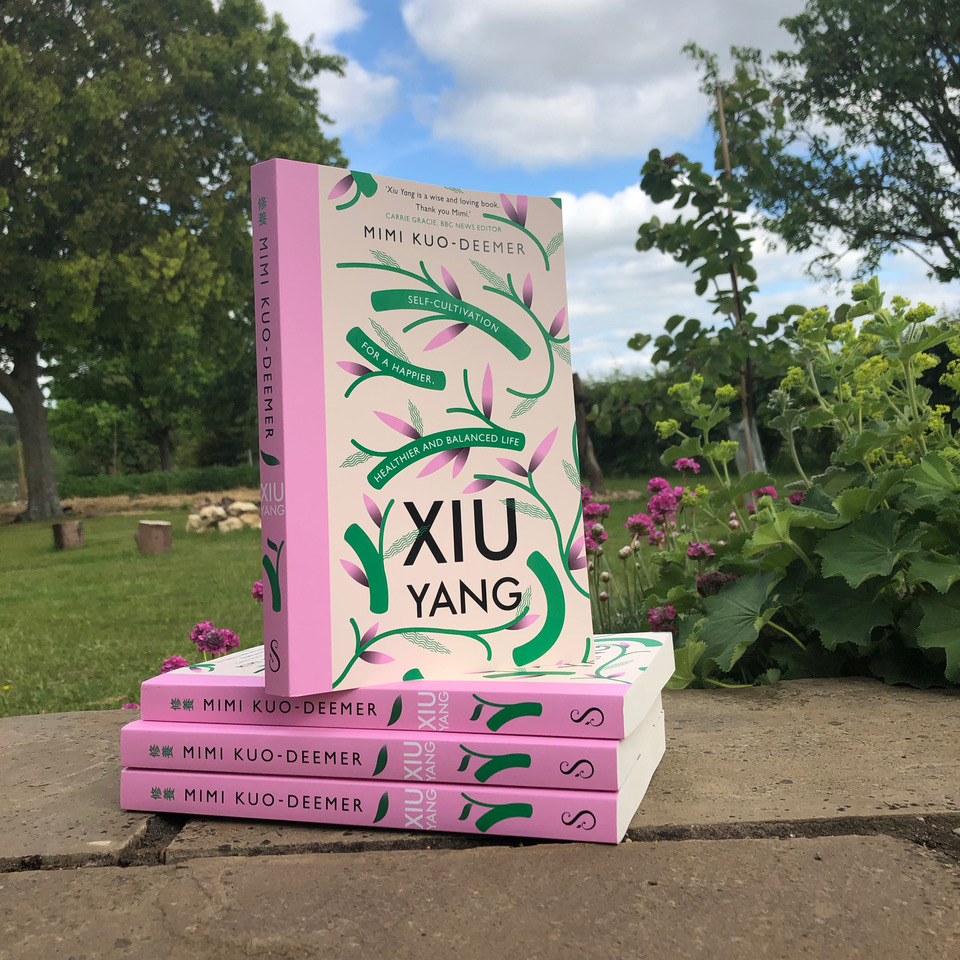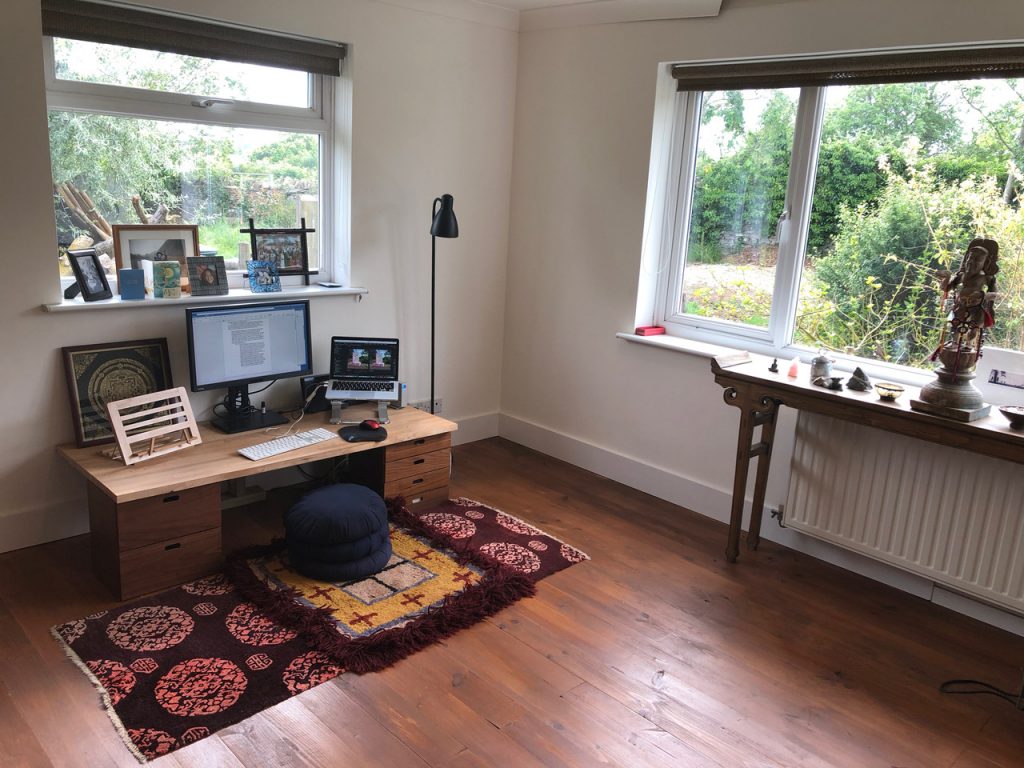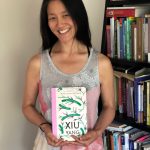
Xiu Yang is Movement for Modern Life Teacher, Mimi Kuo Deemer’s new book which we will be reading for our book club. We caught up with Mimi to find out what Xiu Yang or self-cultivation means.
Join us from 18 June, 2019 for our bookclub when we will be reading Mimi Kuo-Deemer‘s new book Xiu Yang. Sign up to our bookclub to receive the latest updates. Read on to find out what inspired Mimi to write the book and more about xiu yang, or self-cultivation.
The book is about xiu yang or self-cultivation. That sounds like it is something that is long-term, rather than a quick fix. Can you tell us more about what you mean by self-cultivation?
Self-cultivation is the ancient Chinese art of smoothing out roughness and irregularities until our physical, mental and spiritual energies are nurtured, strengthened and integrated with the natural world. Xiu yang is based on the premise that we are part of nature. Nature has evolved to become not only balanced but resilient and self-sustaining. The Chinese believed that as humans are part of the natural world, we can cultivate our potential to live with more balance and sustainability in our bodies, hearts, minds and relationship to the world. If we look to nature for examples, the best trees and plants thrive when they have good soil, hospitable conditions and regular nourishment from sunlight and rain. From this perspective, self-cultivation is a more long-term look at how we choose to live. Yet many of the ways we achieve this long-term goal are quite simple and accessible.
The title of the book is Xiu Yang. Is self-cultivation a direct translation or have you captured the essence of what it means?
The original Chinese phrase for self-cultivation is xiu yang (修養), which is short for ‘xiu xin yang xin’ (修心養心, which means ‘to cultivate and nurture your heart’. The heart is a rich and vast space in nearly all human traditions. For the ancient Chinese, the heart was the home of the Supreme Sovereign. Just like a sovereign who rules over its subjects, the heart plays a critical role in maintaining and ensuring the wellbeing of your whole body. If your heart is strong, clear, open and calm, then the empire of your body will thrive. If it is weak, petty, closed or overstimulated, everything in the domain of your body suffers.
In today’s China, many people associate xiu yang as a quality rather than a process. It’s common for someone to say that a person who is very refined, learned and cultured person has a lot of xiu yang. While xiu yang can reflect one’s character, for most of Chinese history it was understood as cultivating a closer relationship with the natural world through spiritual and physical practices.
Does xiu yang have a deeply rooted history?
As early as the 4th century BCE, the Chinese have seen the importance of adopting practices that nourish and cultivate the heart. Emperors, sages and spiritual seekers embraced xiu yang. They saw it as a way to improve their health and to live a long and happy life. It offered a way to find harmony with the natural world. Some even saw xiu yang as the means through which to achieve spiritual emancipation. To them this was a state of Oneness with all things. Over the last decade, a surge in new Daoist and Buddhist temples and spiritual practices has helped people start reconnecting to the idea of xiu yang. As this tide in the East begins to swell, my hope is that it will help us in the West, to also swim in these rich waters of wisdom.
You have written two books in a year. Congratulations. That is quite a feat – what did you begin to cultivate in yourself through this process?
Thank you! Yes, it was quite a feat. When I look back on the process, I am amazed that it happened at all. Yet I also thought that if I wrote a book about health, happiness and balance but finished it exhausted, burnt out and married to an estranged husband, what would be the point? I therefore decided that I would approach writing and living as an act of self-cultivation in whatever way I could.
For starters, as soon as I signed my book contracts, I took a part-sabbatical for six months to focus on writing. I also cut back on everything non-essential, and created a demanding but realistic writing schedule for myself. At weekends, I always took time off.
Did you have a disciplined writing schedule?
Yes, very! I set my daily schedule to follow the Chinese body clock as closely as I could to help me optimise my energy and focus. The body clock is something I wrote about in one of the chapters of the book. According to Chinese medicine, you have twelve main organ systems with corresponding meridians, or rivers of energy that flow through the body. Each organ system relates to one of five elements, which are Wood, Fire, Earth, Metal or Water, as well as to certain hours of the day. Your organs are believed to function most optimally at different times. What’s fascinating is that now, contemporary science is beginning to confirm many of these rhythms. When you align with these natural and biological rhythms, you regulate your energy flow, which has an immediate and direct impact on your health and well-being.
To follow the body clock, every morning, I would get up early, usually by 5:30, and do my meditation, yoga and qigong. I’d eat meals that were bigger in the morning than in the evening. My working hours were very specific, taking advantage of the morning hours between 9 – 11 am, when the mind is supposedly its most sharp, and the early afternoon hours, when a surge of energy can come back between 3 – 5 pm. I never worked past 6pm. After lunch I took naps. Regular breaks were scheduled in and I aimed to spend an hour each day in the garden weeding, planting or just lying around. I ended my days with long walks, and was always in bed before 9:30 pm.

Following this schedule required discipline, but I am happy to report that by the end I, felt healthier writing five days a week than I did teaching a full schedule of classes each week. I still follow this schedule except on the days I teach in London. It seems to work for me!
We are living through a period of dis-ease, how can xiu yang support us in challenging times?
I strongly believe that shifting the way we think of our body and how we exercise, eat or live, lets us cultivate sustainability and balance from the inside. This can begin to extend outwards in how we learn to live with a long-term goal of harmony.
One of the underlying premises of self-cultivation is that the practices build sustainability and resilience in our lives. The traditional Chinese worldview has been to see human beings as a microcosm of the macrocosm. That everything within us – from the food we eat, water we drink and air we breathe is also a part of the natural world. These basic ideas go against the stream of most conventional opinions. This is especially true if you have grown up under a western model of development. This is that nature is something we can master, conquer or control.
It sounds like this then ripples out into the world
Yes, absolutely. Given the climate emergency unfolding today, we need to make radical changes on personal as well as civic and global scales. I believe xiu yang offers us ways to introduce sustainability and greater resilience into our lives. I hope to offer lessons in self-cultivation that help build strong roots. We can develop resourceful responses to life through a healthy diet, exercise, meditation and reflecting on certain key virtues. With strong roots, we can be like grasses and trees that withstand life’s droughts or storms, and grow back each year.
Part of what I’d like to share with readers is that when we see ourselves as part of nature we can do what nurtures rather than depletes us.
Your approach sounds like it encourages us to tune in to our needs
Absolutely. I believe that when we learn to nurture rather than deplete ourselves, we can also respect rather than always try and dominate our bodies, push less and listen, adapt and respond more to life’s changes.
Do we need to radically change our lives? Or is xiu yang and self-cultivation really about mindset?
It depends on what you think of as radical, I suppose. Some may see eating a hearty breakfast between 7 and 9 am as radical. Others may find this idea a very simple strategy. This one shift can have a profound effect on your body’s metabolism, immunity and energy levels. Some may also see a change in mindset as quite simple. Others may see shifting the way they perceive a situation as extremely difficult or even threatening.
For me, the changes and practices I suggest in Xiu Yang are not intended to be radical. This is because they are based on natural rhythms and patterns already present and unfolding. My sense is Nature is desperate for us to align with her! Believing this, however, may take a radical shift in thinking. If we are to save this planet I think we may need a paradigm shift. New ways of thinking and living are probably highly beneficial risk to consider.
How does xiu yang work alongside practices like yoga, qigong or meditation?
With an eye towards self-cultivation on the mat, yoga can be less about bandaging wounds after the damage has been done. You are not an object that somehow needs fixing or as something to get away from. Rather, yoga practice becomes growing the best in yourself physically, mentally and ethically. Self-care is not always about fixing something broken. Rather, care is something we also cultivate to help us discover our inner balance. This can lead to an outer radiance in body, mind and spirit. This wisdom from the ancient Chinese can help us grow the best in ourselves. It can create a path to health, balance and lasting happiness.
Add Xiu Yang: self-cultivation to your life
If you’re inspired by what you’ve read why not join MFML’s founder Kat Farrants and Mimi for our Bookclub? Join us on Facebook live and our MFML Movers Group to discuss the impact of self-cultivation on your life. And ask any questions you might have. If you want to get moving, then why not try Mimi’s Gentle yoga to nourish and support?
About Mimi Kuo-Deemer:

Mimi Kuo-Deemer is dedicated to living, sharing and evolving the art of xiu yang. She champions the balance of playfulness and precision as the best way forward in life. Mimi never underestimates how sitting, breathing and conscious movement can provide the clearest and most compassionate perspective on the messy, complex and often unpredictable job of being human. Mimi teaches both students and other teachers. She has practiced and taught yoga, qigong and meditation for over twenty years. Mimi has taught in China, the UK, Europe and the United States.Xiu Yang: Self-cultivation for a happier, healthier and balanced life is her second book.





Thanks for sharing this enlightening piece that empowers us to embrace self-cultivation as a path to inner harmony and fulfillment!blog post on Xiu Yang offers valuable insights into the practice of self-cultivation and its profound effects on personal growth and well-being.
Thank you for your comment, I am so glad to hear you resonate with this blog on Xiu Yang and enjoy the practices 🙂